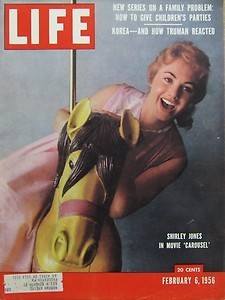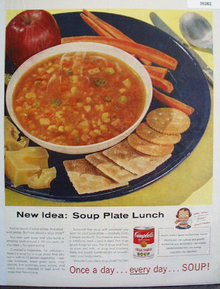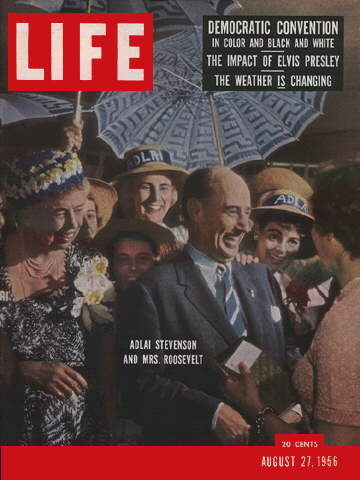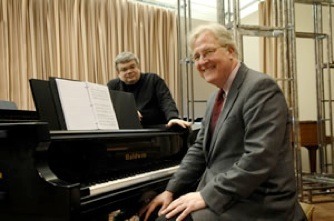Terry Teachout's Blog, page 91
April 3, 2013
TT: Reading matter
Not only is it handsomely and lyrically written, but Ramsey's snapshots of small-town life circa 1948 are altogether convincing, and he has even brought off the immensely difficult trick of worming his way into the consciousness of a deaf person without betraying the slightest sense of strain....Ramsey is no less adept at sketching the constant tension between tolerance and suspicion that is part and parcel of the communal life of every small town. I grew up in a place not unlike the Washington town where Poodie James is set, and so can testify to the knowing skill with which it is portrayed here.
For more information, go here .
April 2, 2013
TT: Almanac
P.G. Wodehouse, Big Money
TT: Snapshot
(This is the latest in a series of arts-related videos that appear in this space each Monday and Wednesday.)
April 1, 2013
TT: Starting gun
 My brother recently sent me a copy of Life published on February 6, 1956, the day that I was born. Nowadays Life, which folded in 1972, is scarcely remembered save by senior citizens, and it was already in terminal decline when I was a boy. In 1956, though, it was still an immensely powerful publication, a tabloid-sized illustrated magazine that ran long, serious articles--it serialized The Old Man and the Sea and Winston Churchill's war memoirs--but was mainly known for its photographs of the week's news, which were shot by the likes of Margaret Bourke-White, Robert Capa, and Gordon Parks.
My brother recently sent me a copy of Life published on February 6, 1956, the day that I was born. Nowadays Life, which folded in 1972, is scarcely remembered save by senior citizens, and it was already in terminal decline when I was a boy. In 1956, though, it was still an immensely powerful publication, a tabloid-sized illustrated magazine that ran long, serious articles--it serialized The Old Man and the Sea and Winston Churchill's war memoirs--but was mainly known for its photographs of the week's news, which were shot by the likes of Margaret Bourke-White, Robert Capa, and Gordon Parks.The rise of television eventually made Life obsolete, just as the coming of the internet is now doing the same thing to Time, its sister publication, but throughout the Forties and Fifties it was Life that showed Americans what the world looked like, and told them what to think about what they saw in its pages.
What did the world look like during the week I was born, midway through the Age of Eisenhower? If you go by Life, things were pretty quiet. Shirley Jones, the star of the surpassingly bland film version of Carousel, was on the cover, and the biggest "story" of the week was an excerpt from Harry Truman's presidential memoirs, for whose serial rights the magazine had laid out a tidy sum. As for the other top-billed story, the cover line tells you all you need to know: "New Series on a Family Problem: How to Give Children's Parties."
As usual, the editors devoted a good-sized chunk of the magazine to a serious but safe high-culture story, a review of a traveling exhibition of paintings by Reginald Marsh, accompanied by an editorial in which readers were assured that it was still all right to like representational art: "Fortunately not all our artists run with the novelty-seeking pack. Fortunately, too, the abstractionist dogma that painting should have nothing to do with nature or humanity has not monopolized the art world."
 As is so often the case with old magazines, it's the ads, not the stories, that turn out to be most interesting in retrospect. Some of the products, like Campbell's Soup, remain familiar to this day. Others are long forgotten. (Does anybody still use Vitalis Hair Tonic?) All, though, are plugged straightforwardly and without a trace of wit, much less irony: "The generous Sun--Some people worship it--all children play in it--and corn soaks up more of it than any other grain. (There's a whole summer of sun in every kernel.) Then Kellogg's flavors, flakes and packages it, calls it Kellogg's Corn Flakes, and gives it back to you every morning.)"
As is so often the case with old magazines, it's the ads, not the stories, that turn out to be most interesting in retrospect. Some of the products, like Campbell's Soup, remain familiar to this day. Others are long forgotten. (Does anybody still use Vitalis Hair Tonic?) All, though, are plugged straightforwardly and without a trace of wit, much less irony: "The generous Sun--Some people worship it--all children play in it--and corn soaks up more of it than any other grain. (There's a whole summer of sun in every kernel.) Then Kellogg's flavors, flakes and packages it, calls it Kellogg's Corn Flakes, and gives it back to you every morning.)"At first I found the sheer earnestness of the ads to be oddly touching, but I was rolling my eyes by the time I'd made it halfway through the magazine.
Contrary to its reputation, America in the Fifties was a lot more exciting than you'd guess from flipping through the pages of this particular issue of Life. Among other things, Elvis Presley sang "Baby, Let's Play House" and "Tutti Frutti" on The Dorsey Brothers Stage Show just two days before Shirley Jones' pretty face appeared on the cover. That particular cultural development had yet to be noticed by the editors of Life in February of 1956, but I dare say it was at least as significant as anything else that appeared in the magazine that year.
 Needless to say, Life eventually caught up with Elvis, running a feature in August that took what the editors doubtless regarded as an even-handed view of his burgeoning celebrity:
Needless to say, Life eventually caught up with Elvis, running a feature in August that took what the editors doubtless regarded as an even-handed view of his burgeoning celebrity:Up to a point the country can withstand the impact of Elvis Presley as a familiar and acceptable phenomenon. Wherever the lean, 21-year-old Tennessean goes to howl out his combination of hillbilly and rock and roll, he is beset by teenage girls yelling for him. They dote on his sideburns and pegged pants, cherish cups of water dipped from his swimming pool, covet strands of his hair, boycott disc jockeys who dislike his records (they have sold some six million copies). All this the country has seen before--with [Johnny] Ray, Sinatra and all the way back to Rudy Vallee.
But with Elvis Presley the daffiness has been deeply disturbing to civic leaders, clergymen, some parents. He does not just bounce to accent his heavy beat. He uses a bump and grind routine usually seen only in burlesque. His young audiences, unexposed to such goings-on, do not just shout their approval. They get set off by shock waves of hysteria, going into frenzies of screeching and wailing, ending up in tears....
Such was Life in the year of my birth.
TT: Almanac
P.G. Wodehouse, Summer Lightning
TT: Lookback
I love parody and caricature, and it's one of my medium-sized regrets that I have no gift for either (though I can do adequate impersonations of a few of my friends). Alas, I find it impossible to get inside another person's prose style. I once tried to write a parody of a Jeeves novel in the style of Bright Lights, Big City. That was actually a pretty good idea, conceptually speaking, but I stalled out halfway through the fourth sentence...
Read the whole thing here .
TT: Coming to life
Paul Moravec, my operatic collaborator, has started to compose the music for The King's Man, our third opera, which will be workshopped this October by Kentucky Opera. I finished writing the libretto late in February, but Paul was busy with another commission and wasn't able to get going on The King's Man until last week.
 The King's Man portrays the stormy relationship between Benjamin Franklin and his illegitimate son William, who were on opposite sides in the American Revolutionary War. Operas are rarely composed in sequence, and Paul decided to start by writing the arietta in which Ben (as Paul and I refer to Franklin in conversation) attempts to explain to his disapproving son why he has a Puritan streak in his character that is sharply at odds with his worldliness:
The King's Man portrays the stormy relationship between Benjamin Franklin and his illegitimate son William, who were on opposite sides in the American Revolutionary War. Operas are rarely composed in sequence, and Paul decided to start by writing the arietta in which Ben (as Paul and I refer to Franklin in conversation) attempts to explain to his disapproving son why he has a Puritan streak in his character that is sharply at odds with his worldliness:
I was born on a Sunday
In the angry shadow of God,
Baptized on the day of my birth
Into a gray, Puritan life
To save me from the fires of hell.
They believed that a child born on a Sunday
Must be a child of Satan.
This was my youth,
From the Puritans of Boston
To the Quakers of Philadelphia:
From same to same,
Gray to gray,
Hard work, cold baths,
Hatred of the joys of the flesh.
(Furious) Damn it all!
God damn it all!
No God of love
Would make such a place,
Cold as ice,
Sharp as a knife,
No joy...
No life.
I sometimes imagine a "dummy" musical background when I write the words for an operatic scene, but I didn't do that this time around. Hence it came as a delicious shock when Paul e-mailed me a sound file of the first compositional draft of "I was born on a Sunday." He trimmed a few lines of my original draft, which was a bit wordy, then transformed the rest of it into a darkly chromatic minor-key episode (it runs for a minute and a half) whose rhythms are sharp and nervous in a way that I never foresaw.
 It's been a couple of years since I last heard my words freshly set to music, and I'd forgotten how startling an experience it is. Even if, like me, you're a trained musician who has dabbled in composition, you simply can't imagine how it feels when music--especially the music of a major composer like Paul--is added to something that you've written. It's more than just a matter of superimposing a layer of color, in the way that a black-and-white film can be electronically "colorized" after the fact. What is added is meaning.
It's been a couple of years since I last heard my words freshly set to music, and I'd forgotten how startling an experience it is. Even if, like me, you're a trained musician who has dabbled in composition, you simply can't imagine how it feels when music--especially the music of a major composer like Paul--is added to something that you've written. It's more than just a matter of superimposing a layer of color, in the way that a black-and-white film can be electronically "colorized" after the fact. What is added is meaning.
The results reminded me yet again that the libretto of an opera is at bottom nothing more than an enabling condition that makes the musical score possible. Of course a libretto has to be dramatically compelling, and if possible it should be memorable in its own right. In the end, though, the only thing that really matters about the words of an opera is what the composer does with them. So far, I like what Paul is doing to my libretto for The King's Man--a lot.
March 31, 2013
TT: Just because
(This is the latest in a series of arts-related videos that appear in this space each Monday and Wednesday.)
TT: Almanac
Charles Lamb, letter to William Wordsworth (Jan. 30, 1801)
March 29, 2013
THEATER ONCE DREW CROWDS ONSTAGE, TOO
Terry Teachout's Blog
- Terry Teachout's profile
- 45 followers



